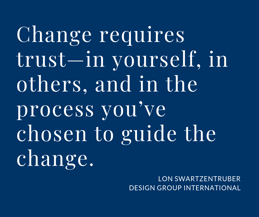 In June’s post , I introduced how courage, curiosity, and trust can help us navigate change successfully. In July, I talked about courage in depth, and in August , I put curiosity under the microscope. This month I’m taking a deep dive into trust.
In June’s post , I introduced how courage, curiosity, and trust can help us navigate change successfully. In July, I talked about courage in depth, and in August , I put curiosity under the microscope. This month I’m taking a deep dive into trust.
Implementing change requires an atmosphere of trust—in yourself, in others, and in the process you’ve chosen to guide the change. But building trust always and without exception requires vulnerability. Being vulnerable with others and yourself can be tough. Developing trust (both in yourself and with others) can help you (and them) embrace change, instead of pushing it away.
Trust in Leadership
Earlier this year, I worked with a very well-grounded chief executive. As I came to know her better, I learned that one of the things that grounds her is trusting in her own voice.
Trusting in her voice has helped her navigate difficult conversations, build the organization, work with her board, and more. Trusting herself as a leader is her superpower, and it affects everything she does.
During the development of the organization’s strategic plan, this same executive needed to trust others as well as herself. She engaged her leadership team in a nontraditional conversation. She asked them to help her identify her blind spots. We all have blind spots: the places where we don’t see clearly, the stuff we are not conscious of, the times where we are susceptible to making a bad decision.
What happened in that conversation surprised her.
Because she was willing to be vulnerable, her team mirrored that vulnerability, and they all went deeper in their relationship with each other than ever before. Team members shared their own blind spots, what drove them as individuals, what they feared, as well as what they hoped for. Vulnerability builds trust.
Trust in the Process
Trusting in the process you choose to guide change, can be challenging. When change occurs, it’s unsettling, and people (or systems) often fight back. We get used to doing certain things in certain ways to achieve certain outcomes. That’s why taking the time to develop a sound process for addressing change is so important.
At Design Group, we’ve learned that developing a process based on inquiry is essential. By posing questions to leaders, we uncover together what is at the heart of their desire for change and what they hope to achieve through it. When everyone is clear on the “why” of a change process, trust builds.
As we’ve seen over the last few months, courage, curiosity, and trust are a powerful triad that can help you approach, embrace, and engage change. Giddy up!
If you have a question, thought, or example you’d like to share related to trust and change, I’d love to hear it! Please comment below. You may also reach me directly at lons@designgroupintl.com.

Tags:
leadership coaching, lon swartzentruber, business, deep dive, nonprofit, education, faith-based community, A Cause Greater Blog/Lon%20L.%20Swartzentruber%20Headshot%20(300x300).png)
September 10, 2019

Comments